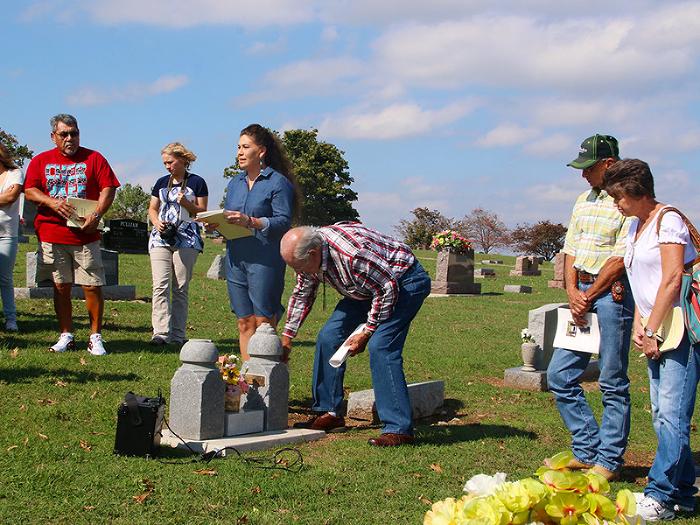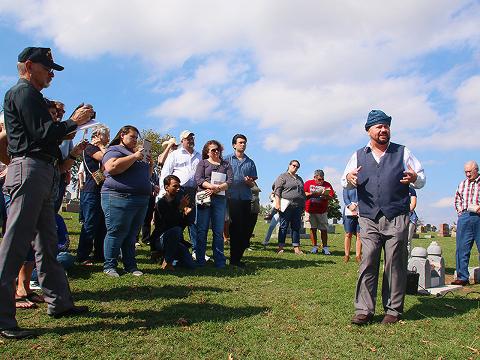 |
Canku Ota
|
 |
|
(Many Paths)
|
||
|
An Online Newsletter
Celebrating Native America
|
||
|
November 2016 - Volume
14 Number 11
|
||
|
|
||
|
Cherokee Family Joins
Trail of Tears Association To Honor Forced Removal Survivor
|
||
|
by Will Chavez - Senior
Reporter Cherokee Phoenix
|
||
TAHLEQUAH, OK – After the Cherokee Adult Choir sang the last notes of Amazing Grace, the descendants of Margaret "Peggy" Dick, a Trail of Tears survivor, gathered around her grave for photos and to say their goodbyes. Her descendants gathered Oct. 15 at the Tahlequah City Cemetery to honor their common ancestor who had traveled the Trail of Tears as an infant with her parents Ti-kah-eh-ski, known in English as Dick Easky, and her mother Patsy Tidwell. They had lived in the old Cherokee Nation at Suwanee Old Town on the Chattahoochee River in what is now Gwinnett County, Georgia. Peggy's older siblings Nancy, Alsie, Susie, Pressha and Andrew also made the journey west to Indian Territory with the Moses Daniel detachment. David Stand of Tahlequah said he was happy to meet many new relatives among the people who came to honor their common ancestor. He added his "heart is heavy" for what his great-grandmother went through to make it to Indian Territory. Stand said he knew very little about his grandmother other than what his dad and aunts shared with him as a young man. He said what he now knows about his grandmother was learned recently through his daughter Robin's research. "It's honor and a blessing. I was humbled because I didn't know I was going to meet all of these people who are family," Stand said. "I feel a rebirth because I now know who my grandmother was and what she endured on the Trail of Tears."
Birth records from the old Cherokee Nation can be sparse or non-existent, but it's believed Margaret "Peggy" Dick was born about 1838 at what is now Ball Ground, Georgia. The family had moved from Suwanee Old Town to the Ball Ground area near the confluence of the Etowah River and Long Swamp Creek because of problems with white encroachment. Her Cherokee name was Wakee, but she was frequently called "Peggy." In the spring of 1838, U. S. soldiers began rounding up Cherokees to begin the forced removal west. After a delay during the summer, the Easky family left with the Daniel detachment on Sept. 30, 1838, from Bradley County near present-day Cleveland, Tennessee. They arrived in Indian Territory on March 2, 1839, and disbanded at Webber's Depot in what is now Stilwell after traveling 164 days and suffering approximately 48 deaths. Robin Stand of Tahlequah is the great-great granddaughter of Dick. She said about a year ago she began researching her ancestors on Ancestry.com, so that she could have information to share with her son and family members. Through her research she met relatives Sue and Harry Hood and Kori Carriger, another great-granddaughter. "We started digging and we started sharing back and forth. Sue and Harry did the extra steps to talk to the Trail of Tears (Association) to get the plaque put on her grave," she said. "It's humbling and it's a honor, and I'm just glad I was able to participate and pull this all together for my family on the Stand side." Stand said at least six generations of Dick's family attended the Oct. 15 marking ceremony. She added on the Stand side of the family she was able to go back six generations and on the Dick side she went back seven to eight generations. "I'm pretty astonished by how much I've been able to find," she said. In 1839, the Easkys settled in the Going Snake District of the Cherokee Nation. Dick Easky died in 1840. About 1855, Peggy married an Old Settler Cherokee, Alexander Campbell. They had one son, Alexander. Peggy's husband died about 1857 and about 1859 she married Jack Daugherty Stand. They had one son, Robin Bruce Stand. Jack died early in the Civil War. About 1863 Peggy married Charles Dick who was of Creek and Cherokee descent. They had six children, Andrew Dick, John Henry Dick, Sarah Dick, Taylor Dick, George Washington Dick and Charles A. Dick. The Dick family farmed in what is now Adair County. Peggy Dick died on December 7, 1887 in Tahlequah and Charles Dick died on July 27, 1888. They are both buried in the Tahlequah City Cemetery. Sue Franklin Hood of Fort Worth, Texas, said her mother was of the Dick family and was born in Checotah, Oklahoma. She married her father who was in the Air Force and moved the family extensively, so she did not grow up in Oklahoma and did not get to learn about her Cherokee heritage. When she began researching her mother's family she discovered Margaret Dick was her great-grandmother. "It was a very inspiring learning situation, and it brought me to these cousins I've never met before," she said. "It's such an amazing feeling for everyone to come together and honor this woman that went through so much." She added she wanted the family attending the ceremony to understand that the forced removal of her ancestors is not just confined to history books, it happened to Cherokee families like theirs. Oklahoma Chapter of the Trail of Tears Association President was present at the Oct. 15 ceremony and unveiled a bronze plaque that the association had attached to Dick's headstone. The plaque reads: "In honor of one who endured the forced removal of the Cherokees in 1838-39. The Trail of Tears Association Oklahoma Chapter." The plaque also includes the TOTA and Cherokee Nation seals. "It's a privilege for us as the Oklahoma Chapter of the Trail of Tears Association to mark your ancestor's grave who came on the Trail of Tears," Rohr told the family. "This is one of our main projects in the Oklahoma chapter, so we are very privileged and honored to be able to do this." |
||||
|
|
|
|
||
|
|
||
| Canku Ota is a free Newsletter celebrating Native America, its traditions and accomplishments . We do not provide subscriber or visitor names to anyone. Some articles presented in Canku Ota may contain copyright material. We have received appropriate permissions for republishing any articles. Material appearing here is distributed without profit or monetary gain to those who have expressed an interest. This is in accordance with Title 17 U.S.C. Section 107. | ||
|
Canku Ota is a copyright ©
2000 - 2016 of Vicki Williams Barry and Paul Barry.
|
||
 |
 |
|
|
The "Canku
Ota - A Newsletter Celebrating Native America" web site and
its design is the
|
||
|
Copyright ©
1999 - 2016 of Paul C. Barry.
|
||
|
All Rights Reserved.
|
||

